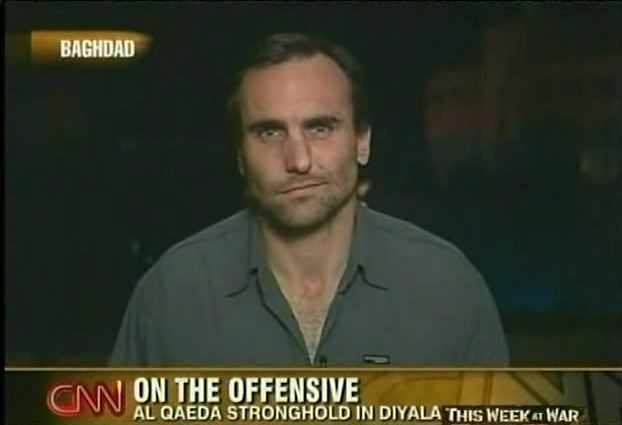TWAW: "...a much more Lebanon-style civil war once U.S. forces draw down..."

Length: 3:58
LARGE (46.5 MB) ----- SMALL (4.6 MB)
TOM FOREMAN: It's all well and good to discuss the war in Iraq from here in Washington, to look at the big picture battle plans and intricate political arguments, but to really understand it, someone has to go out there, out with the troops on the frontlines. This week Michael Ware did just that. He went to the Diyala River Valley, known as the DRV. It is over in this side of the country, the eastern part of the country. That's where al Qaeda once ran a mini-state, everything from a police force to courts that operated under religious law. Before we get into our discussion, take a look at some of his report.
(BEGIN VIDEO CLIP)
WARE (voice-over): While the surge in the Iraqi capital dominates public attention, the DRV is at the heart of al Qaeda's military operations. And in recent months, U.S. forces have been battling to take this valley. Flooding it with paratroopers, much of the fight for the DRV now rests with this man, Lieutenant Colonel Andrew Pappas of the 5-73rd airborne squadron. Of his 300-plus men, 21 have been killed, most here in the valley.
(END VIDEO CLIP)
FOREMAN: And back from his embed in the DRV valley, Michael Ware joins us from our Baghdad bureau. Michael, what do you see out there right now? Are we making progress or not?
WARE: Well, progress is a many-varied thing, Tom. I mean, in one sense, militarily, are U.S. forces currently putting pressure on the al Qaeda network in the province of Diyala? Yes, absolutely. Their hierarchy, their structures right now are under strain. And they've since been dispersed. Part of that has come because America is finally able to commit some forces to these regions. I mean the DRV has been an al Qaeda stronghold for years. It has been relatively untouched. And it is only now that the military's been able to go in and reclaim that valley.
But there's also other problems as well. Militarily, yeah, they've pushed al Qaeda out. But we find in that valley, like in most of the countryside, it's now been ethnically cleansed or segregated by sectarian faith. It is now either pure Sunni or pure Shia villages. And here's a small example from the DRV: recently a Sunni battalion of the Army arrived from Fallujah and the Sunni villages celebrated. Why? Because the police force is Shia and it has been linked to the deaths of a number of their sheikhs and an untold number of their young men. So they want the army to stand up against their own police. That's the sectarian divide we're leaving behind.
FOREMAN: So that speaks to the notion we started this show with, that some people believe that we're already in the earlier stages of a civil war and that's part of what's happening in Diyala.
WARE: We have to be kidding if we think at this stage that we can still be debating whether there's a civil war or not. I mean, that's beyond the pale now. I mean, on any textbook definition or political scientist definition of civil war, you have that, right now, here in this country. Now, it may be boiling away at a certain temperature, bubbling to a certain degree. The real point is, once you draw down U.S. forces --below say 100,000 or 75,000 -- that's simply enough troops just to protect the Americans themselves. The civil war will erupt of its own accord in and around these troops. There it will reach a boiling point where it will bubble over the top of the pot. There is a civil war now. And the building blocks are well and truly in place for a much more Lebanon-style civil war once U.S. forces draw down, be it this year or next.
FOREMAN: We know you'll keep track of all that's going on in Diyala and the rest of the country. Thanks so much Michael for your time.
